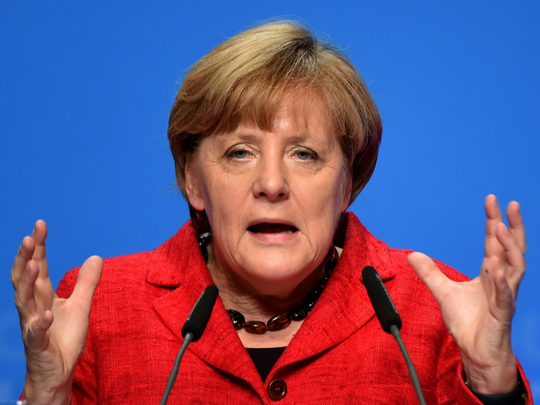
Germany is struggling to cope with immigrants. The authorities have lost count because many have not registered. Millions are in transit. The discussion among Germans has understandably focused on the political consequences, especially on whether Angela Merkel has been wise to stick to her open-door policy. One way to answer this question is to look at the economic impact of the refugees.
I understand that one of the reasons, though not the main one, the German chancellor chose to invite refugees is to fix an imminent demographic squeeze. The immediate issue is not the total population size, which for now is relatively stable at a little over 80 million. The more pressing issue is the decline in Germany’s working age population. This leads to an increase in the dependency ratio — the number of those in work who support those not in work.
The Federal Statistics Office estimates that the number of people in the 20-65 age group is set to fall from 49.2 million in 2013 to 48.8 million in 2020. This is on the assumption of weak immigration, defined as a fall of average net immigration from 500,000 in 2014 to a little over 100,000 by the end of the decade. In another scenario under which net immigration would fall to 200,000 the working population would stabilise at 49.2 million. Since the sheer number of refugees puts us well beyond this second scenario, one might conclude that net immigration would fix the problem for as long as it persists and is large enough.
This is true, but it produces new problems. The irresistible force of the refugees is hitting the immovable object of a high minimum wage, set at €uro 8.5 (Dh35.5) per hour. The issue is not so much the principle of a statutory minimum wage, which is common in the industrialised world, but that the number at which it was set was too high, even without the refugees. It is certainly too high now.
If there was no minimum wage whatsoever, one would expect an increase in the number of immigrants to produce a fall in the lower wage level. That would be one of the scenarios where the refugee crisis could turn into a political minefield for Merkel. She will not accept it. Nor will her Social Democrat coalition partners.
Good news
With the minimum wage stuck at current levels, the overall wage level in the economy will still fall, but in a more indirect way. Many of the unskilled among the refugees will initially be unemployed. A few will be able to enter subsidised training programmes. So the overall pool of labour willing to work at the minimum wage will rise by a lot. This will put sustained pressure on the band of wages just above the minimum wage level. And this will work itself upwards through the wage spectrum.
In particular, it will quickly end the one real piece of good news we have had from the whole of the Eurozone this year. After a long period of stagnation, German wages have finally been rising. In the second quarter this year, real wages - after inflation — were up by 2.7 per cent compared with 2014.
What else can the government do? It might be tempted to agree subsidies for employers who employ refugees at the minimum wage. However, this would crowd out unsubsidised minimum wage workers. If the goal is to avoid a political backlash, you do not want to go down this route. Another possibility would be to absorb the refugees in large-scale publicly funded investment programmes, on infrastructure for example. That would make much economic sense given Germany’s chronically low investment rates in the private and public sectors. But it is not going to happen for largely ideological reasons. Merkel has opened up to refugees, but not to Keynesian economic arguments.
This leaves us with an old fashioned labour supply shock. No matter what scenario you choose, wages will fall in the long run.
Now consider the impact on the rest of the Eurozone. After a brief interlude of rising real wages, Germany is entering another period of wage restraint. The persistent gaps between Eurozone countries in unit labour costs in the past decade were one of the reasons for the subsequent Eurozone crisis. By streaming into Germany, but not into other Eurozone countries, the refugees unwittingly increase the internal economic imbalances in the single currency area. Another period of real devaluation beckons - an improvement in Germany’s relative competitive position. This is about the last thing the Eurozone needs as it struggles to recover.
There is an obvious solution to the problem. Germany absorbs some of the refugees and deploys them in public sector infrastructure programmes, and the Eurozone shares the rest of them according to an agreed quota system. In that case, the impact of the refugees would be positive in the short and the long run.
Sadly, the Eurozone has a history of not choosing obvious solutions.
— Financial Times








